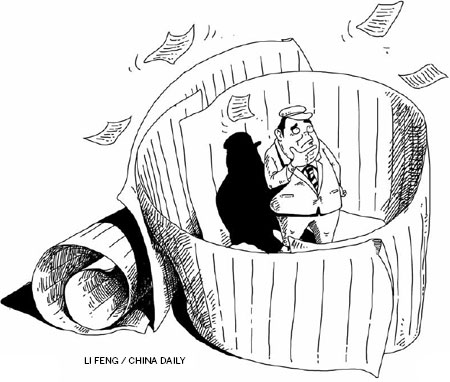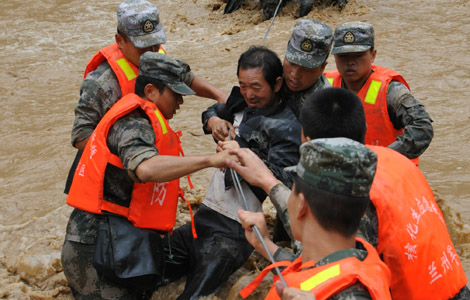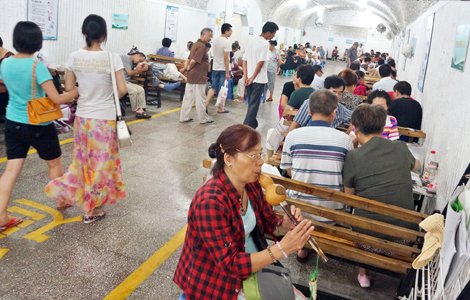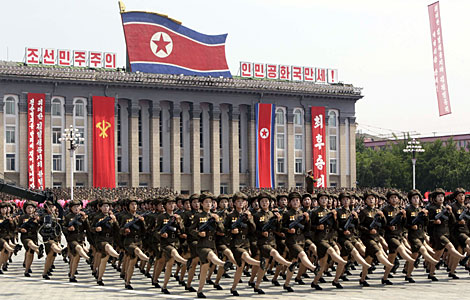Power to the people Chinese-style
Updated: 2013-07-29 07:09
By Eric Sommer (China Daily)
|
||||||||

'A desk is a dangerous place from which to watch the world." This phrase from novelist John Le Carre aptly summarizes the problem President Xi Jinping is trying to solve with his new "mass line" and bring Party and government officials closer to the people.
Chinese officials, like their counterparts in other countries, must provide overall direction on issues, which often means working "behind the desk". But relying on second- and third-hand reports on conditions "out there", while sitting behind the desk, can be very dangerous, because the reports could be inaccurate, dishonest or lack key information. To address this contradiction and to effectively implement the mass line, the authorities have to take several measures.
Officials have, in recent decades, carried out periodic inspections of government organizations and other facilities, and schools and villages in an attempt to ascertain the real conditions. But local officials have all too often been informed in advance to expect an inspection team, which enables them to make preparations to impress the visiting officials.
I once taught in a college where, on learning that an inspection team was coming, the officials started special training sessions to instruct students to conceal the real conditions. I tried to stop this but could not.
Human nature being what it is, in most cases surprise inspections, with no advance notice, may be needed to determine the real state of government facilities, schools and villages.
Chinese officials could also consider some unusual steps that some governments and businesses in the West have taken to "move closer to the people". Some senior managers of large department store chains, for example, spend an afternoon working as ordinary cashiers, thereby gaining a more accurate understanding of real customers' experiences.
Similarly, a Chinese official might want to spend regular time "on the front lines", interacting as a regular worker with visitors to his/her ministry or department.
The minister in charge of the welfare system in the Canadian province where I lived spent a month experiencing the conditions endured by the welfare recipients. He survived on the same small amount of money, lived in the same kind of shabby housing and ate the same cheap food that welfare recipients did, and thus gained firsthand knowledge of the real conditions of the people his ministry served.
Perhaps a Chinese official responsible for assisting farmers who have migrated to a city in search of better income could spend some time living and working as a "migrant worker".
During the revolution, and for some time afterward, the Communist Party of China was composed mainly of workers and farmers, and therefore stood close to the people. Recruiting more ordinary workers and farmers as Party members is perhaps another key to bringing the Party and government closer to the people.
Another way of bringing Party and government officials closer to the people is the Internet. Online sites like weibo have already enabled ordinary citizens to play an important role in reporting and curbing corruption and poor governance. Ordinary people have exposed corrupt officials, the improper use of government vehicles for private business, wastage of public money on lavish dinners and other violations on weibo.
Such sharing of information on the Internet has become an important part of people's supervision of governments. But much more can be done.
Using the Internet to solicit public opinion is very important. Active and animated online discussions on issues selected by government (or the people) can take place even before precise questions are formulated. In fact, the collective wisdom of the people that emerges from such discussions can be incorporated into government policies.
In the age of the Internet, China has the opportunity to use the latent powers of information and communications technology to enable wider participation in public discourses and decision-making, which can eventually help bring officials closer to the people.
The author is a Canadian freelance writer living in China.
(China Daily USA 07/29/2013 page12)
Most Viewed
Editor's Picks

|

|

|

|

|

|
Today's Top News
Experts advise CEOs on how to make it in the US
Israeli-Palestinian peace talks to resume
Latest US-China talks should smooth the way
Audit targets local government debt
30 people killed in Italy coach accident
Brain drain may be world's worst
Industry cuts cloth to measure up to buyers' needs
Reckless projects undermine the prosperity hopes
US Weekly

|

|















